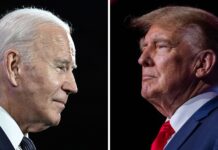Treasury prices rose Friday, extending the weekly decline in yields, as waning hope for a swift resolution to a trade agreement between the U.S. and China dampened appetite for stocks, and stoked inflows into haven assets like government paper.
The 10-year Treasury note yield
TMUBMUSD10Y, +0.00%
fell 2 basis points to 2.632%, contributing to a 5.8 basis point weekly decline. The 30-year bond yield
TMUBMUSD30Y, +0.00%
was down 1.9 basis points to 2.975%, extending its weekly drop to 5.5 basis points. The 2-year note yield
TMUBMUSD02Y, +0.00%
fell 1.6 basis points to 2.463%, adding to a 4.5 basis-point weekly decline. Bond prices move inversely to yields.
Optimism around a near-term resolution to the Sino-American trade spat—a factor that has helped to buoy stocks since January—took a hit this week after National Economic Council Director Larry Kudlow on Thursday said there was “a pretty sizable distance” to go before a trade agreement could be reached.
On top of that, President Donald Trump said he didn’t expect to meet Chinese leader Xi Jinping before the March 1 trade-deal deadline, but a CNBC report suggested the U.S. wasn’t likely to raise import tariffs on Chinese goods on that date as initially planned. Politico also reported Trump is expected to sign an executive order prohibiting the use of Chinese telecom equipment from U.S. wireless networks.
“The trade talk kind of took the wind out of the sails of the risk-on trade,” said Larry Milstein, head of government and agency trading at R.W. Pressprich & Co.
The S&P 500
SPX, +0.07%
and Dow Jones Industrial Average
DJIA, -0.25%
were trading lower on Friday.
See: Asian markets drop on renewed worries over U.S.-China trade talks
Jitters around the global economy’s health also weighed on sentiment as growth forecasts for the U.K. and the eurozone were cut this week, drawing investors into haven assets like government paper.
Read: How the European economy is raising fresh global growth fears
“The investor exuberance we saw in January has become noticeably more cautionary this week, as geopolitics have once again heightened uncertainty along with some softer looking economic fundamentals and a rather mixed set of corporate earnings,” wrote Gary Kirk, a portfolio manager at TwentyFour Asset Management.
Traders also saw some speeches from officials at the Federal Reserve. San Francisco Fed President Mary Daly said the economy was slowing down to a more sustainable pace. St. Louis Fed President James Bullard said the central bank’s policy stance was “a little bit restrictive,” and that the Fed should worry about missing its inflation target on the low end.
Providing critical information for the U.S. trading day. Subscribe to MarketWatch’s free Need to Know newsletter. Sign up here.
Source : MTV












